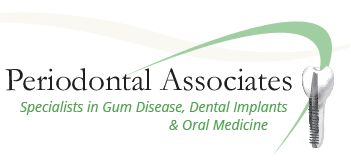 Do you know if you are at risk for periodontitis, the advanced form of gum disease? The CDC reports that 50% of Americans over 30 and 70% of those over 65 have periodontitis, and many of them do not know it. Harmful bacteria are silently collecting below the gum line, eating away at the foundation of a healthy, attractive smile. It’s a smart idea to have an evaluation with a gum disease specialist – a periodontist.
Do you know if you are at risk for periodontitis, the advanced form of gum disease? The CDC reports that 50% of Americans over 30 and 70% of those over 65 have periodontitis, and many of them do not know it. Harmful bacteria are silently collecting below the gum line, eating away at the foundation of a healthy, attractive smile. It’s a smart idea to have an evaluation with a gum disease specialist – a periodontist.
Dr. Ovadia and Dr. Tanur are board-certified periodontists, experts in the diagnosis and treatment of gum disease. With years of advanced training and experience, they have the knowledge to repair damage caused by gum disease and prevent the disease from doing further harm.
But My Teeth Feel Fine!
People often don’t realize that they have periodontal disease until it has caused gum recession and bone loss. Left untreated, gum disease leads to tooth loss. “One of the things that makes gum disease so dangerous is that the symptoms are easy to miss,” says Dr. Ovadia. “Patients may not be having any pain or discomfort, so they aren’t concerned. Since prevention is the best method for addressing gum disease, we recommend a routine periodontal screening.”
The Telltale Signs of Gum Disease
Take note if your gums bleed or appear red or swollen. Healthy gums are pale pink and do not bleed during brushing or flossing. People often think their bad breath is caused by foods they have eaten, but chronic bad breath can mean that bad bacteria are present.
As gum disease progresses, gums may pull away from the teeth. Teeth become sensitive and the gums tender. Eventually, bone loss occurs. There may be a change in the way teeth fit together when biting down, or in the fit of a dental appliance or partial denture. Teeth can become loose, and chewing may become painful. If you are experiencing any of these symptoms, do not wait!
To make an appointment, call 214-377-0855 or request an appointment online.What Are the Risk Factors?
Inadequate oral hygiene is a leading cause of gum disease. Even if you brush and floss regularly, poor technique can undermine your efforts. Crooked teeth, deteriorating fillings and crowns, and bridges that don’t fit well can make it harder to maintain good oral health, even for those who are doing their best to keep their teeth clean.
Various lifestyle choices and health issues also increase your risk. Dr. Ovadia says, “Anyone who falls into a high-risk category should be checked by a specialist regularly.”
- Smoking causes many health problems, including gum disease—and it actually makes gum disease harder to detect.
- People with diabetes, rheumatoid arthritis or immuno-deficiencies, and those who take certain medications also have higher rates of periodontitis.
- Other factors that add to the likelihood of developing gum disease are stress, heredity, and hormonal changes such as with pregnancy or the use of oral contraceptives.
Gum Disease Treatment
The good news is that in the earlier stages, the effects of periodontitis can be reversed using minimally invasive treatments such as a deep cleaning, scaling and root planing, antibiotic therapy or laser-assisted periodontal treatment. Patients whose gum disease is more advanced can benefit from gum and bone grafting. If one or more teeth are missing or damaged beyond saving, Drs. Ovadia and Tanur offer replacement options including long-lasting dental implants.
Prevention and early intervention are key to keeping gum disease under control. Schedule a consultation at Periodontal Associates and find out if you are at risk for—or already have—gum disease. If you do have gum disease, the skilled and knowledgeable doctors can provide comprehensive treatment.
To make an appointment, call 214-377-0855 or request an appointment online.
